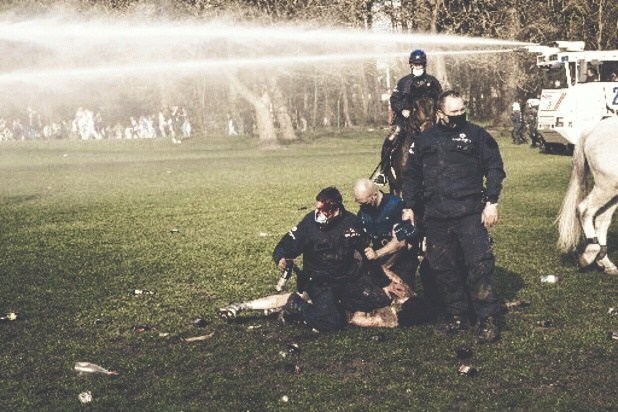BRUSSELS BEHIND THE SCENES
Weekly analysis and untold stories
With SAMUEL STOLTON
Other Brussels behind the scenes stories:
The future of the European Rave
Reporting on Brussels away from Brussels
The Privilege of the Vaccinated
The slow death of April Fools’ Day
When a lie is loosed upon the world, it becomes almost impossible to rein in.
Brussels police informed citizens as early as 17 March that the so-called 'La Boum' festival at the Bois de la Cambre park was an April Fool's joke and had not been authorised to go ahead.
BRUSSELS BEHIND THE SCENES is a weekly newsletter which brings the untold stories about the characters driving the policies affecting our lives. Analysis not found anywhere else, The Brussels Times' Samuel Stolton helps you make sense of what is happening in Brussels. If you want to receive Brussels behind the scenes straight to your inbox every week, subscribe to the newsletter here.
But the event, which had reportedly been pitched online by a group of artists in a spirit of innocent joviality, was taken in earnest by thousands of Brussels youngsters, who, desperate for an intemperate interval from coronavirus restrictions, congregated on 1 April nevertheless.
That which met the lockdown revellers was a robust police presence. Conflicts between the two parties ensued, and the scenes that played out across the conventional tranquillity of the park's lulling lawns and gentle slopes was nothing short of a springtime spectre of combat - shocks of afternoon sunlight flashing against airborne beer bottles, as they flew from the hands of the unruly and the unrestrained.
The clashes aside, this week’s events at Bois de la Cambre present a startling reality: Never before have the frontiers between truth and falsehood become so dissolved to the extent that they have today.
I found this to be the case on several occasions this week, as part of the media outlay of April Fools’ stories that, at first sight, were not immediately recognisable as false.
Such is the nature of reality in a post-truth world, where the outlandish becomes normalised, where the otherworldly becomes, well…worldly. This is symptomatic of a conditioning we have all been subjected to following four years of a Trump Presidency, alongside the rise of gullible, vulnerable, and malleable political ideologues, who breed in numbers across pocketed corners of the platform economy, their voices raising to battle-scarred screams in their own self-contained echo chambers.
It wasn’t surprising, therefore, that celebrations for International Fact Checking Day went down like a lead balloon on Friday. As soon as the sun rose on the Bois de la Cambre, with a team of industrious litter-pickers tiptoeing in between the broken glass and discarded, blood-stained clothes, it was hardly the right time for Europe to gloat over its assets in the fact-checking ecosystem.
Fact-checking is always a reactive process. It is always performed after the information itself has been transmitted and is firmly embedded in the cultural psychosphere – opinions are shaped before truth has had the opportunity to intervene and right the wrongs. Here, fact-checking loses its efficacy. Despite the best efforts of the fact-checking community, the practice would not have stopped the Capitol Hill riots earlier this year, however many sham claims of election fraud had been debunked.
The inclination to engage in direct action as a result of false and misleading information marks a new phase in the post-truth epoch. There are sentiments in the minds of many that require little political coercion from those in power. Certain individuals have devolved themselves of independent thought and enquiry and have rather offered themselves up as lambs to the slaughter for political causes based on counterfeit claims.
This context makes the April Fool’s Day news cycle - once the fun-loving refuge of the light-hearted and jovial in the industry, an altogether perilous project – something recognised by Google, after it transpired this week that the company had, for the second year in a row, ordered staff to hold back on any pranks or jokes online that could cause wider public confusion.
This is a sad indictment on our quality of discernment and judgement, and a humiliating appraisal of our uncharted heights of ignorance and idiocy, in which we have become profoundly unequipped to distinguish a fact from a falsity. Forget the truth – we don’t know how to handle an untruth.
Moreover, the European Commission this week sought feedback on how it should improve its ‘code of practice against disinformation’ - a voluntary agreement between the EU executive and a handful of the world’s largest platforms, in which the firms commit to reducing the spread of fake news online.
The Commission says its internal assessment has found ‘inconsistences in application and gaps in coverage of the Code’s commitments,’ and therefore wants to ensure that such loopholes are closed, before Europe experiences its own Capitol Hill.
The debate is wrought with a miscellany of political potholes, which, should some overzealous leaders treat with a lack of sensitivity, could really result in backfiring. Freedom of speech is a fundamental principle to preserve. But perhaps it is the ‘freedom of reach’ that has become a staple ingredient of the network culture which forms the basis of our everyday interactions online, that should rather be targeted by regulators. The future of April Fool’s day may just very well depend on it.
BRUSSELS BEHIND THE SCENES is a weekly newsletter which brings the untold stories about the characters driving the policies affecting our lives. Analysis not found anywhere else, The Brussels Times' Samuel Stolton helps you make sense of what is happening in Brussels. If you want to receive Brussels behind the scenes straight to your inbox every week, subscribe to the newsletter here.

